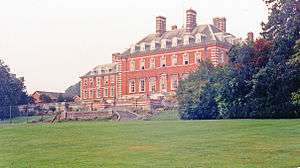Bryanston School
 | |
| Motto |
Et nova et vetera (Both the new and the old) |
|---|---|
| Established | 1928 |
| Type | Independent school |
| Religion | Church of England |
| Head | Sarah Thomas |
| Founder | J. G. Jeffreys |
| Location |
Bryanston Blandford Forum Dorset DT11 0PX England 50°51′58″N 2°11′10″W / 50.866°N 2.186°WCoordinates: 50°51′58″N 2°11′10″W / 50.866°N 2.186°W |
| DfE URN | 113910 Tables |
| Staff | 118 |
| Students | 809 pupils |
| Gender | Mixed |
| Ages | 13–18 |
| Houses | 12 |
| Colours | Dark Blue & Yellow |
| Former pupils | Old Bryanstonians |
| Website |
www |
Bryanston School is a co-educational independent school for both day and boarding pupils, located next to the village of Bryanston, and near the town of Blandford Forum, in Dorset in South West England. It was founded in 1928. It occupies a palatial country house designed and built in 1889–94 by Richard Norman Shaw, the champion of a renewed academic tradition, for Viscount Portman, the owner of large tracts in the West End of London, in the early version of neo-Georgian style[1] that Sir Edwin Lutyens called "Wrenaissance", to replace an earlier house, and is set in 400 acres (1.6 km2).
Bryanston is a member of the Headmasters' and Headmistresses' Conference and the Eton Group.[2] It has a reputation as a liberal and artistic school using some ideas of the Dalton Plan.
History
The school opened on 24 January 1928 with 23 pupils and seven members of staff. In 2004, the school had around 650 pupils and 80 teachers.
During the mid-1930s, Bryanston School was the location of Anglo-German youth camps where the Hitler Youth and Boy Scouts tried to develop links.[3]
In 2005 the school was one of fifty of the country's leading independent schools which were found guilty of running an illegal price-fixing cartel.

In 2014 the school opened a new music building, the Tom Wheare Music School, designed by Hopkins Architects and named after a headteacher of Bryanston. The 300-seat concert hall was named after conductor Sir Mark Elder, who had been a pupil at the school.[4] The interior of the building won a 2015 Wood Award.[5]
Houses
- Allan (Girls)
- Beechwood (Junior Boys)
- Cranborne (Junior Boys)
- Connaught (Senior Boys)
- Dorset (Senior Boys)
- Greenleaves (Girls)
- Harthan (Girls)
- Hunter (Girls)
- Portman (Senior Boys)
- Purbeck (Girls)
- Salisbury (Senior Boys)
- Shaftesbury (Senior Boys)
Heads of Bryanston
- J. G. Jeffreys (1928–32)
- Thorold Coade (1932–59)
- Robson Fisher (1959–74)
- Rev. David Jones (1974–82)
- Bob Allan (acting head, 1982–83)
- Tom Wheare (1983–2005)
- Sarah Thomas (2005–present) — first female head of Bryanston.
Old Bryanstonians
Alumni of the school are known as Old Bryanstonians; there is an alumni organisation called the Bryanston Society. "The Society exists to further the cause of Bryanston in the broadest possible sense. It aims to bring together the whole Bryanston family through social and sporting events."[6]
Other information
- The school estate has Europe's tallest London Plane tree (160 ft).
- Each year, the JACT Ancient Greek Summer School is held at Bryanston; the school has played host to many of the United Kingdom's classicists, both as teachers and pupils.
- The school hosts the annual Dorset Opera Festival, which combines amateur and professional performers. Operas are staged at the conclusion of a two-week summer school.[7]
See also
| Wikimedia Commons has media related to Bryanston School. |
- List of independent schools in the United Kingdom
- Canford School, a boarding school in Dorset
- Don Potter (1902–2004), sculptor, potter and teacher at the school 1940–1984
- R. Norman Shaw (1831–1912), architect of the main building
- The Coade Hall, a theatre at the school
References
- ↑ "An approximation to what was later to be called Neo-Georgian", according to Roderick Gradidge, Dream Houses: the Edwardian ideal 1980:49
- ↑ Walford, Geoffrey (1986). Life in public schools. Taylor anf Francis. pp. 10–11. ISBN 978-0-416-37180-2.
- ↑ The mystery of Hitler's 'spyclists' Radio 4 Today Programme
- ↑ Diarmuid MacDonagh (14 September 2014) "School opens new state-of-the-art £8.5m music facility", Dorset Echo. Retrieved 2015-12-05.
- ↑ Wood Awards 2015: Interiors, RIBA Journal, 10 November 2015.
- ↑ Bryanston Society objectives Archived 18 July 2011 at the Wayback Machine., Bryanston School, UK.
- ↑ Christiansen, Rupert (4 August 2009). "Opera singing is not just for professionals". The Daily Telegraph. Retrieved 12 July 2013.
Further reading
- The Burning Bow, Thorold F. Coade. London: Allen & Unwin (1966). ISBN 0-04-370001-2.
- Bryanston Reflections: Et nova et vetera, Angela Holdsworth (editor). London: Third Millennium Publishing (2005). ISBN 1-903942-38-1.
External links
| Wikimedia Commons has media related to Bryanston School. |
- Bryanston School website
- UK Schools Guide entry at Archive.is (archived 21 April 2013)
- Independent Schools Inspectorate report, 2007 at the Wayback Machine (archived 2 December 2008)
- Dorset Life article on the history of the school building
- Leading sculptors mark school's 75th birthday, The Guardian, 2 June 2003